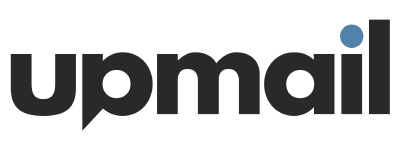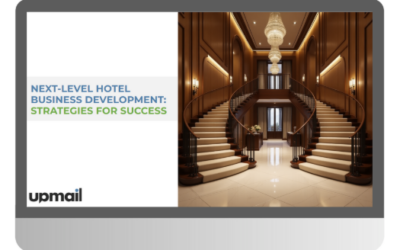Mastering Hotel Sales Proposals:
10 Best Practices for Success
April 10th, 2024
Crafting a winning hotel proposal requires more than just presenting a document; it’s about having a solid grasp on the clients needs, highlighting your hotel’s distinctive offerings, and seamlessly weaving it all into an easily digestible format. Beyond the proposal itself, factors like responsiveness, adaptability, and diligent communication play pivotal roles in sealing the deal.
Here, we outline ten essential best practices for creating and cultivating successful hotel proposals.
1. Determine Suitability
Avoid the temptation to bid on every opportunity that arises. Assess whether the program aligns with your hotel’s offerings and target market. If it doesn’t, refrain from investing time in completing the RFP. If you opt not to pursue the RFP, communicate your decision to the planner promptly, ensuring they are not left waiting for your response.
2. Prioritize Prompt Response Times
First and foremost, make sure to respond to the RFP within the deadline. While this may seem obvious, according to recent surveys, one of the primary considerations for venue selection in 2024 is the speed with which venues can reply to communications (46%) and 72% of first responders win the business. Respond promptly and professionally to inquiries and provide attentive customer service throughout the proposal process to reflect positively on your hotel’s reputation.

3. Make it Personal
Tailor your proposal to the specific needs and preferences of the client. A proposal shouldn’t be a one-size-fits-all document. While you can leverage reusable content, each proposal should be tailored to the specific response. Here are some tips on how to accomplish this:
- Address the recipient by their name.
- Incorporate booking details, such as company/booking name, event dates, and expected number of attendees.
- Provide information about available room blocks and event spaces specific to their booking, accompanied by relevant photos and details.
- Emphasize how your hotel can fulfill their requirements. For instance, if hosting a sports team, highlight your fitness facilities and wellness programs.
- Include visuals tailored to their market, such as romantic lifestyle photos for wedding proposals or corporate setups for conferences.
Read our blog on Tailoring Hotel Proposals to Specific Market Segments.
4. Visual Content
Visual content is essential in presenting your hotel’s offerings effectively. By incorporating high-quality images and visuals of your event space, guest rooms, and amenities, you help clients visualize their stay. Instead of relying solely on standard hotel photos, utilize lifestyle images and snapshots of past events to set the tone and personalize the experience.
Also, leverage innovative tools like 360-degree videos or virtual tours to provide planners with a comprehensive and interactive view of your space. Research even suggests that virtual tours can boost booking rates by up to 67%, underlining their effectiveness in driving conversions.
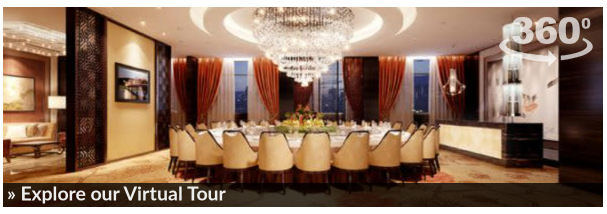
5. Showcase Flexibility
Offer flexibility and options in terms of room configurations, menus, and activities to accommodate different preferences and group sizes. Recent surveys highlight that the top priorities for venue selection in 2024 are aligning with evolving program objectives and the ability to accommodate adjustments, with percentages as high as 49% and 47% respectively. By prioritizing the clients requirements, your hotel demonstrates your commitment to meeting the client’s needs.
6. Keep It Clear and Concise
In today’s content-saturated world, simplicity goes a long way. Make sure your proposal is succinct and to the point, avoiding unnecessary details. Instead of cluttering the body of the proposal, consider linking out to webpages and documents for additional information on your hotel’s highlights. Use tables and bullet points to streamline readability and ensure easy comprehension. By keeping it clear and concise, you’ll make a stronger impact on your audience.
7. Highlight Unique Selling Points
Spotlight distinctive amenities, services and highlights that set your hotel apart in a competitive market. While it’s crucial to avoid overwhelming with too much detail, it’s equally important to emphasize what makes your establishment unique – it could be your prime location, unique brand elements or extensive dining options.
Beyond the expected amenities, there’s a growing demand for wellness and sustainability initiatives. In 2024, sustainability will be a priority for 90% of event planners, favoring eco-friendly practices in venues. In addition, 85% of attendees anticipate wellness offerings, including fitness facilities and healthy food choices. Adapting to these evolving preferences not only draws in but also secures group bookings.
8. Include Testimonials & Reviews
Incorporating testimonials from satisfied planners or glowing reviews from reputable sources can significantly bolster credibility and trust. Social proof not only reassures clients of the exceptional quality of your hotel and services but also provides tangible evidence of positive experiences adding a personal touch.
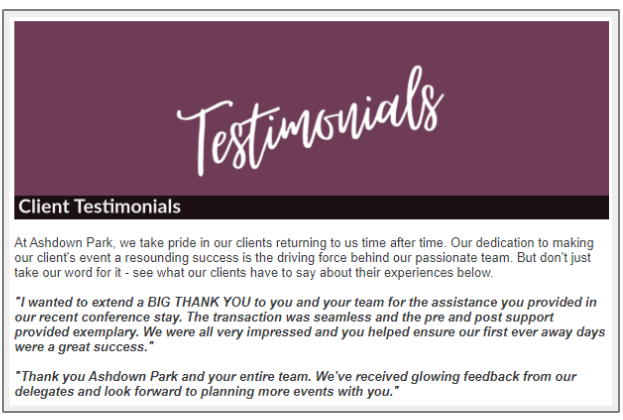
9. Be Professional
While it may seem obvious, it’s essential to avoid spelling and grammatical errors as well as formatting mistakes. Simple errors can reflect poorly on your hotel’s reputation and credibility. Taking the time to thoroughly review your final proposal before hitting send ensures that all details are in place, maintaining professionalism and enhancing the effectiveness of your communication.
10. Assess Proposal Performance
After sending the proposal, the work doesn’t end there. It’s crucial to set a reminder not only to follow up but also to evaluate the proposal’s performance. If you have access to insights such as when the proposal is opened and which content the recipient engages with, leverage that data for your follow-up. Craft your follow-up message to include items of interest that the recipient clicked on, demonstrating attentiveness to their needs.
In addition, keep track of the documents and links that perform well to continually enhance future proposals. By systematically assessing proposal performance, you can refine your approach and increase your success rate over time.
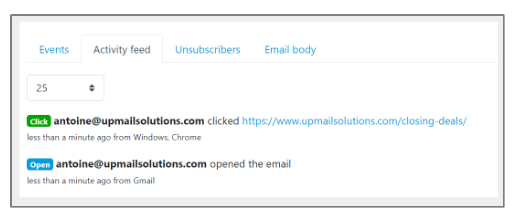
With these best practices in mind, using a tool like UpMail empowers your hotel sales team to create and send professional, tailored proposals swiftly and effortlessly. With the ability to seamlessly swap content, and include images and 360-degree videos, UpMail streamlines the proposal creation process. Integrations with Sales & Catering Systems like Amadeus Delphi further enhances efficiency by automatically importing data and event/guest room tables from bookings.
Additionally, UpMail’s ability to provide insights on sent proposals equips your team with valuable data to optimize their approach. By leveraging UpMail, you’ll not only enhance efficiency but also increase the conversion rate of your group bookings.
Images by mrsiraphol on Freepik & Freepik
Pre-Opening Hotel Sales Strategies: Set the Stage for Success
Get ahead before you open your doors. Discover pre-opening hotel sales strategies that drive early revenue, build brand awareness, and set your team up for long-term success.
Attachments Are Out. Why Hotel Sales Teams Should Switch to Embedded Links
Still attaching PDFs and Word documents to emails? Discover a smarter way to share wedding brochures, catering menus, and event proposals using embedded links that elevate your brand and professionalism.
Next-Level Hotel Business Development: Strategies for Success Webinar Recap
Didn’t catch our recent Next-Level Hotel Business Development: Strategies for Success webinar? No problem – here’s your quick recap!


